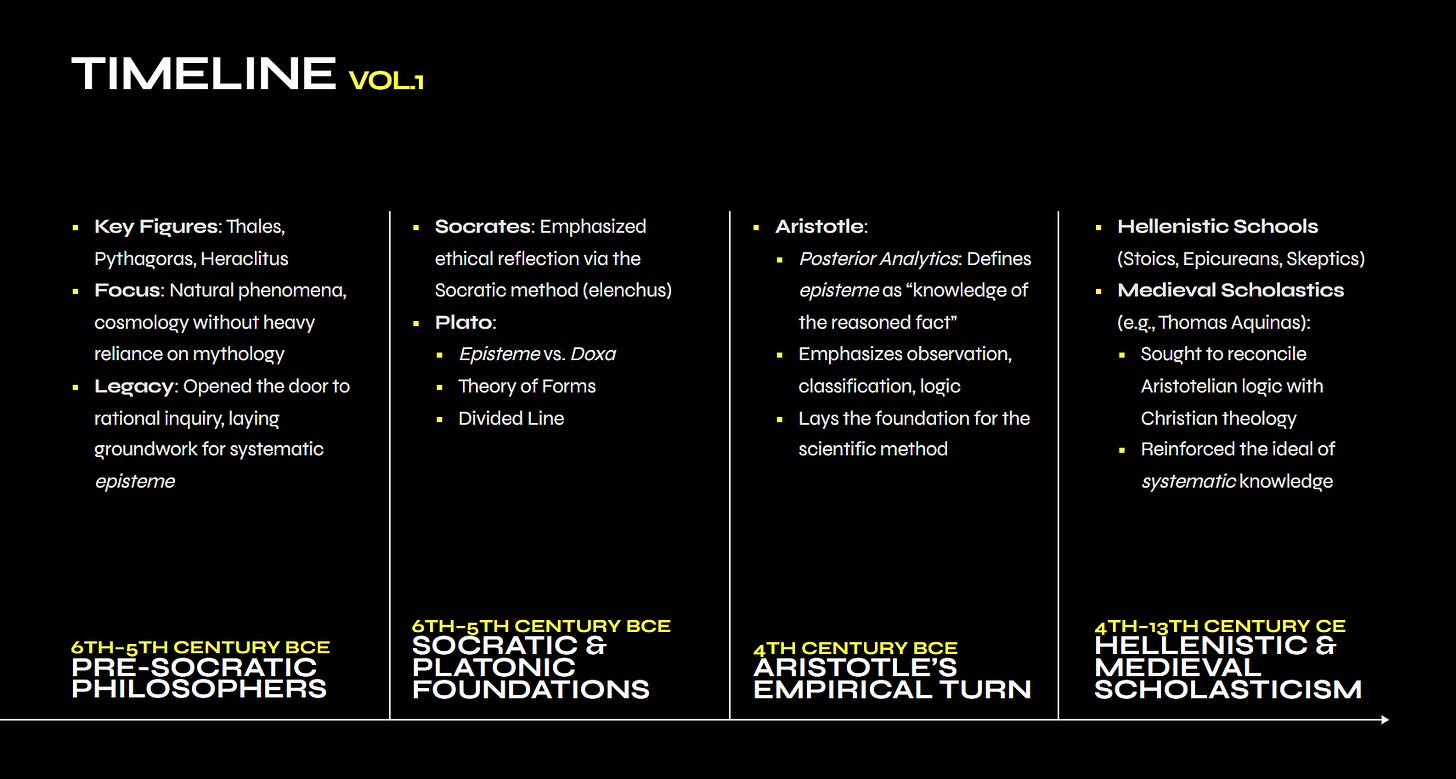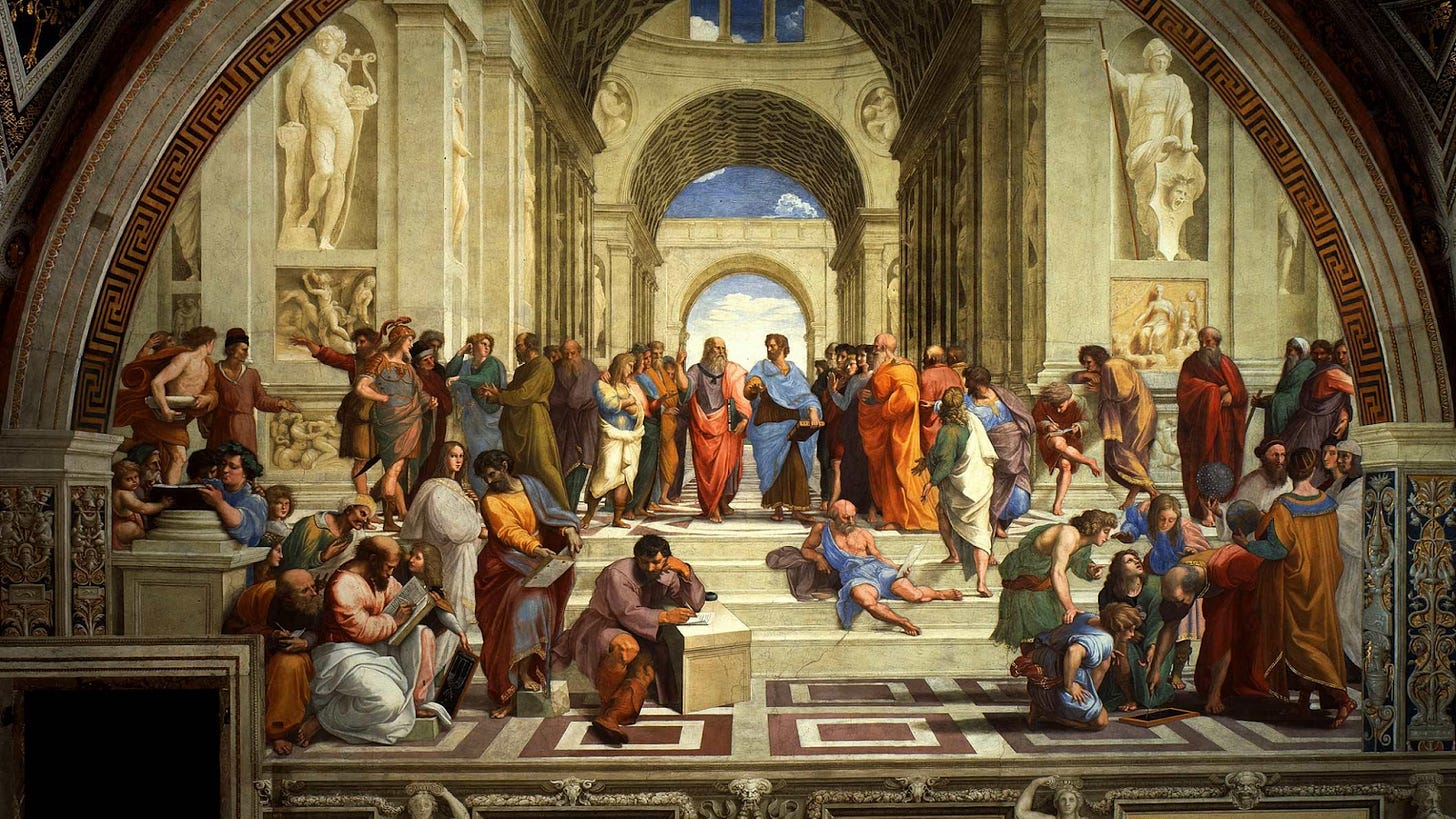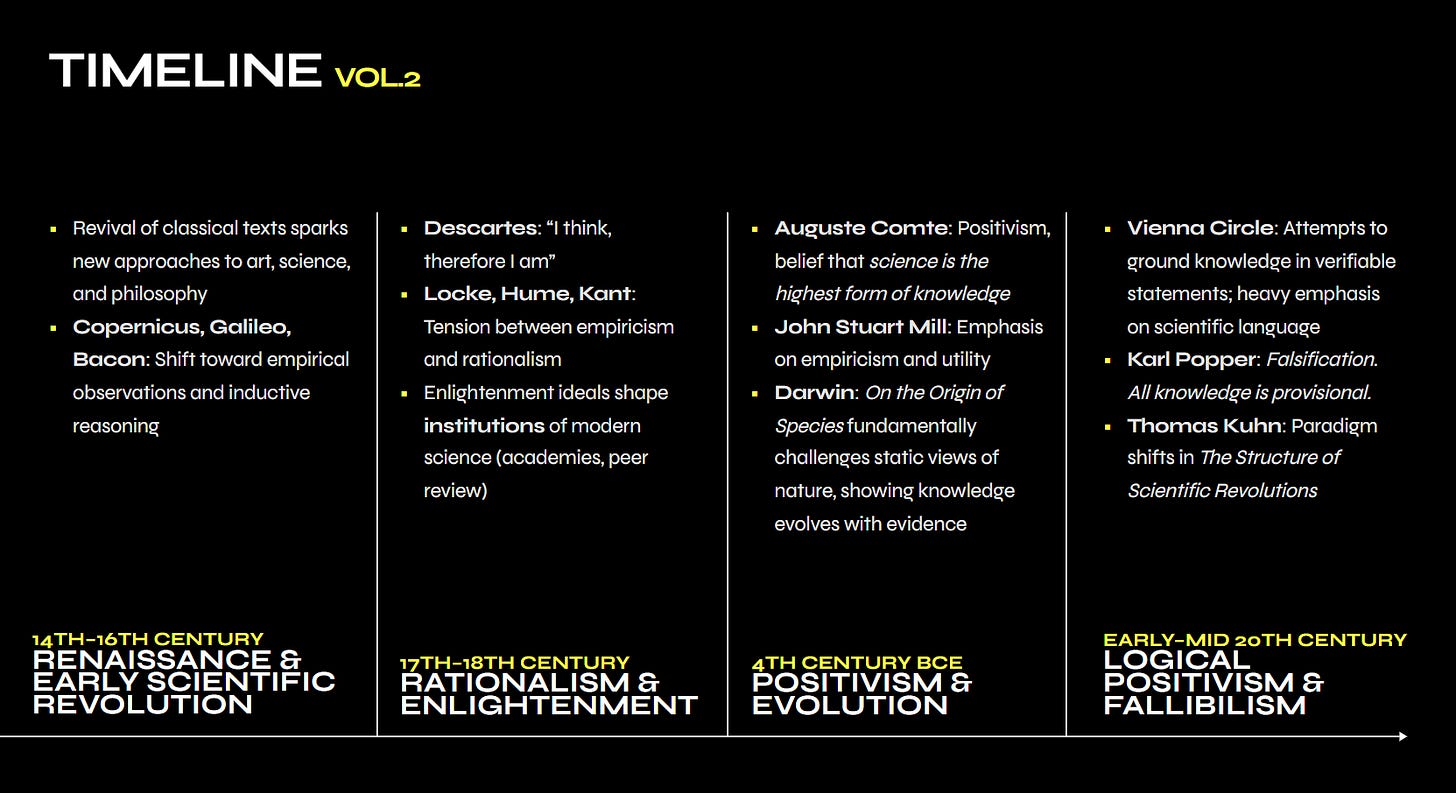“All men by nature desire to know.”
– Aristotle, Metaphysics (Book I, 980a21)
In an age of information overload, AI hallucinations, and institutional mistrust, the question “What counts as true knowledge?” has never felt more urgent. Science faces a reproducibility crisis. Peer review is increasingly opaque. And while algorithms flood our feeds with answers, the foundations of epistemic certainty feel shakier than ever.
At Episteme, we believe it's time to revisit the roots of knowledge itself.
Our decentralized platform for AI-resolved prediction markets builds on a long lineage of philosophical inquiry—from Plato’s ideal Forms to Foucault’s critique of power-knowledge regimes. We aren’t just creating a tool for forecasting; we’re reimagining how science works. This article traces the evolution of the word episteme, explores how its meaning has shifted across time, and shows how it underpins the structures we’re building in the age of DeSci and intelligent automation.
1. The etymology of episteme
The term episteme (ἐπιστήμη) comes from Ancient Greek and typically translates as knowledge, understanding, or science. While modern English often uses “knowledge” to cover multiple shades of meaning, the Greeks had a more nuanced vocabulary to distinguish between different types of knowing. Episteme implied a high level of justified certainty—a true, systematic, and demonstrable understanding of reality—especially compared to doxa (δόξα), which connoted mere opinion or belief (Liddell; Scott, 1940).
In everyday usage among the Greeks, episteme often referred to what we might call “science” or “scholarly knowledge.” This distinction underpinned many foundational debates in Western philosophy, influencing how thinkers conceptualized reality, truth, and the methods for arriving at justified beliefs.
2. Plato’s episteme vs. doxa
“Opinion is the medium between knowledge and ignorance.”
— Plato, The Republic (477e)
No early philosopher emphasized the importance of episteme more deeply than Plato (427–347 BCE). In his famous analogy of the Divided Line (Republic, 509d–511e), Plato distinguishes between the visible world (associated with opinion, or doxa) and the intelligible world (the realm of true knowledge, or episteme). He asserts that only the realm of eternal Forms can be the object of genuine knowledge—a knowledge that is unchanging and certain, unlike the mutable opinions tied to the physical world.
For Plato, mathematics, logic, and philosophical dialectic are pathways to episteme. By systematically probing ideas through dialectical questioning (the Socratic method), one can move beyond subjective appearances to apprehend permanent and universal truths. This vision underlines an important aspiration: to ground inquiry in rigorous, structured reasoning rather than fleeting impressions.
In the spirit of Plato, Episteme (our project) aspires to build a system where scientific knowledge is not lost in the fog of biases and guesswork. The AI-driven resolution of prediction markets aims to minimize subjectivity. Much like Plato’s quest for objective Forms, Episteme seeks verifiable, transparent outcomes that transcend the noise of mere speculation.
3. Aristotle’s scientific episteme
Aristotle (384–322 BCE), one of Plato’s most illustrious students, diverged from his mentor by emphasizing empirical grounding. While he agreed that episteme should be systematic and demonstrable, he argued that knowledge begins with observation of the natural world. In his work Posterior Analytics, Aristotle describes episteme as “knowledge of the reasoned fact” (Book I, 71b9), derived from logical demonstration starting with self-evident first principles.
Aristotle’s approach laid the groundwork for the scientific method—empirical data collection, systematic classification, and deductive reasoning. This more scientifically oriented view of episteme is central to modern research, where evidence-based experimentation and peer review form the backbone of academic rigor.
Bridging Plato and Aristotle in Episteme
Plato’s vision: Abstract, ideal truths accessible through reason.
Aristotle’s method: Concrete, empirical validation of knowledge claims.
Our platform merges these traditions by encouraging hypothesis formulation (akin to Platonic rational inquiry) while relying on real-world data to confirm or falsify predictions (Aristotelian empiricism). The interplay between theoretical insight and empirical evidence is at the heart of both classical epistemology and decentralized AI protocols.
4. From the Enlightenment to fallibilism: Knowledge institutionalized and contested
“The game of science is, in principle, without end. He who decides one day that scientific statements do not call for any further testing… retires from the game.”
— Karl Popper, The Logic of Scientific Discovery (1959)
Following the foundational insights of Plato and Aristotle, the concept of knowledge continued to evolve through centuries of intellectual transformation.
During the Renaissance and early Scientific Revolution (14th–16th centuries), European scholars returned to ancient Greek texts with fresh eyes. The intellectual climate shifted from theological certainty to empirical curiosity. Thinkers like Nicolaus Copernicus, Galileo Galilei, and Francis Bacon rejected reliance on authority and instead emphasized observation, experimentation, and inductive reasoning. The natural world, once treated as a divine mystery, became a subject of investigation—something that could be systematically studied and understood. The scientific method, though not yet fully formalized, began to take shape as a reliable process for generating knowledge.
The Enlightenment (17th–18th centuries) deepened this transformation. Rationalist philosophers like René Descartes sought indubitable foundations for knowledge, beginning with pure thought. In contrast, empiricists such as John Locke and David Hume insisted that experience and sensory data are the true basis of understanding. Immanuel Kant famously attempted to reconcile these positions by arguing that while knowledge begins with experience, it is shaped by the mind’s innate structures. Alongside these philosophical debates, the period also saw the rise of scientific institutions: academies, journals, and the emergence of peer review. Science became a public, procedural enterprise—one grounded not just in individual insight but in collective validation.
In the 19th century, the optimism of Enlightenment rationalism gave rise to grand epistemic ambitions. Auguste Comte advanced positivism, a view that science—understood as systematic observation and fact-based reasoning—represented the highest form of human knowledge. John Stuart Mill emphasized the practical utility of knowledge, especially in improving social outcomes. Perhaps most radically, Charles Darwin reframed nature itself as a process of evolution—a slow, adaptive struggle in which variation is tested by the environment. Knowledge, by implication, was no longer static or final. Like species, ideas could evolve over time, subject to forces of selection and survival.
But the early 20th century brought a shift in tone. Confidence in the finality of scientific truth gave way to epistemic humility. The Vienna Circle attempted to ground science in logical precision and verifiability, but their vision of a purified scientific language proved too rigid. Karl Popper responded with his theory of falsification: scientific theories, he argued, can never be proven true—only shown not to be false. All scientific knowledge, in this view, is inherently provisional and must remain open to revision. Building on this, Thomas Kuhn in The Structure of Scientific Revolutions argued that science does not progress in a linear accumulation of facts. Instead, it moves through paradigm shifts—periods in which the dominant worldview is overturned and replaced by a new one. Scientific revolutions, Kuhn suggested, are not purely rational but involve deep cultural, psychological, and institutional upheaval.
This lineage reveals a core tension still alive today: between certainty and contingency, authority and openness. Episteme (our project) draws on this historical arc by acknowledging the institutional power of science while also proposing its decentralization. Inspired by Popper’s fallibilism, our platform treats knowledge as dynamic and contestable—resolved not by fiat, but through transparent, market-driven mechanisms.
Just as the Enlightenment built institutions to formalize truth-seeking, Episteme builds infrastructure—but with a Web3 ethos: permissionless participation, AI-driven resolution, and tokenized incentives. We’re not replacing the scientific method; we’re giving it new architecture.
5. Foucault’s radical reinterpretation
“An episteme … is the total set of relations that unite, at a given period, the discursive practices that give rise to epistemological figures, sciences, and possibly formalized systems.”
— Michel Foucault, The Order of Things (1966)
In the 20th century, the concept of episteme experiences a shift in emphasis. The French philosopher Michel Foucault (1926–1984) argues that episteme is not just an individual or scientific understanding, but rather an overarching structure that defines what can be known—and by extension, what can be considered true—in a given historical period. In The Order of Things (Les Mots et les choses, 1966), Foucault shows how the “episteme” of the Classical era differs from that of the Renaissance, shaping the very foundations of scientific discourse.
For Foucault, institutions, power structures, and cultural norms collectively determine the contours of episteme. He insists that each epoch imposes rules on what is deemed “legitimate” knowledge, often unconsciously. This perspective unveils the hidden gatekeepers of knowledge: academic institutions, professional bodies, funding agencies, and more.
6. Episteme in the age of DeScAI
As we enter the 21st century, the structures through which knowledge is produced, validated, and shared are undergoing another profound shift—this time driven not by telescopes or printing presses, but by cryptographic protocols and artificial intelligence. The epistemological transformations of earlier centuries—Plato’s ideal forms, Aristotle’s empiricism, the Enlightenment’s institutions, and Foucault’s critiques—converge in a moment where the infrastructure of truth is being reimagined in real-time.
Decentralized technologies, particularly those emerging from the Web3 ecosystem, offer new models of consensus and authority. In place of hierarchical editorial boards or elite academic institutions, we see the rise of permissionless, transparent systems where truth claims can be evaluated by open participation rather than closed gatekeeping. Blockchains—as distributed ledgers of verifiable events—introduce a novel epistemic logic: if it’s on-chain, it’s auditable; if it’s auditable, it’s contestable.
Within this context, Decentralized Science (DeSci) emerges as both a critique of and a response to the limitations of traditional scientific infrastructure. In many ways, it reflects Foucault’s insight that knowledge is shaped by power. Funding priorities, peer review bottlenecks, and institutional prestige—all function as invisible constraints on what gets researched, published, or rewarded. DeSci, by contrast, leverages tokenized incentives, community-led validation, and open-access frameworks to create a more fluid and participatory epistemic environment.
Meanwhile, AI and machine learning have introduced a new kind of epistemic actor: one that can process vast datasets, detect patterns, and even generate hypotheses at scales and speeds beyond human capacity. When integrated into systems like prediction markets, AI can serve as an automated oracle—a mechanism for resolving scientific claims not through expert consensus, but through algorithmic analysis of real-world data. This introduces an important epistemological inversion: where knowledge was once validated by authority, it is now increasingly inferred by models, scored probabilistically, and priced in markets.
At first glance, this might seem to reduce knowledge to numbers. But in fact, it echoes deeper philosophical traditions. The interplay of theoretical insight (as emphasized by Plato) and empirical validation (as emphasized by Aristotle) finds a new expression in systems where rational modeling and statistical evidence co-operate, rather than compete. The Platonic pursuit of clarity and the Aristotelian commitment to observation both reappear—this time, encoded in algorithms.
7. The open continuum of knowing
Episteme, as a platform, stands at the intersection of these developments. We view scientific knowledge not as static or elite-driven, but as something that can be generated, tested, and validated by decentralized communities using algorithmic tools and transparent protocols. By tapping into the oldest philosophical debates on the nature of knowledge, we recognize that the future of scientific inquiry rests on our ability to blend rigorous methodology with open participation. Through Episteme, we aim to transform that philosophical heritage into a living, evolving network that pushes the boundaries of how truth emerges and is rewarded in our complex world.
References
Plato. The Republic. Translated by Paul Shorey, Harvard University Press, 1935. (Notably Book VII for the Divided Line analogy.)
Aristotle. Posterior Analytics. Translated by G. R. G. Mure. In The Basic Works of Aristotle, edited by Richard McKeon, Random House, 1941.
Aristotle. Metaphysics. Translated by Hugh Tredennick, Harvard University Press, 1933.
Foucault, Michel. The Order of Things. Routledge, 2002 (originally published in French, 1966).
Liddell, Henry George; Scott, Robert. A Greek–English Lexicon. Oxford University Press, 1940.









Mathēma is also knowledge, that which is learnt, after for example 20 years of experience. How does Episteme deal with the "prescribed reality"? For example, the evolution theory of Darwin has been disproved.